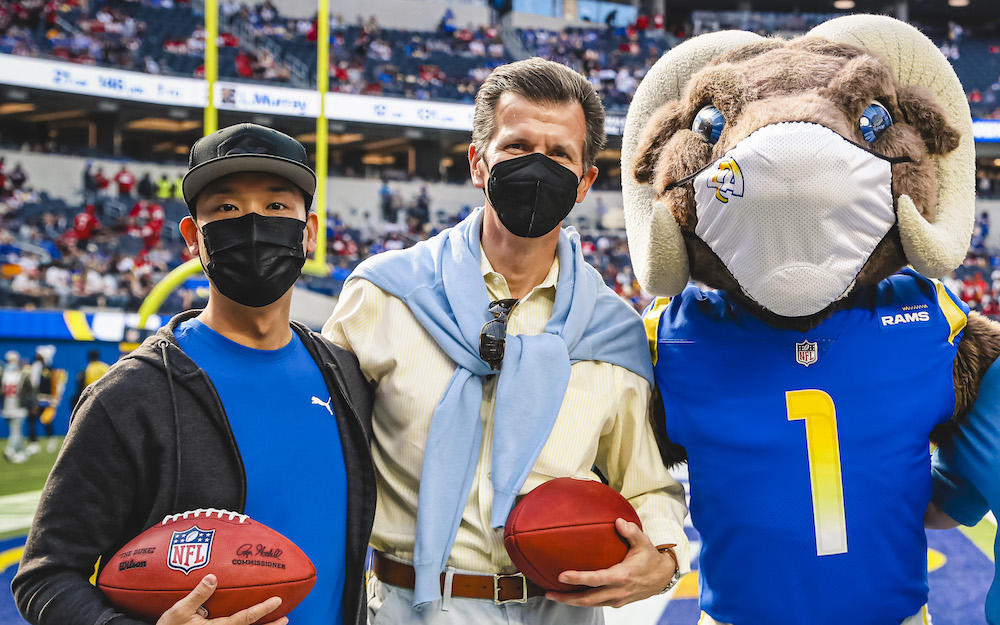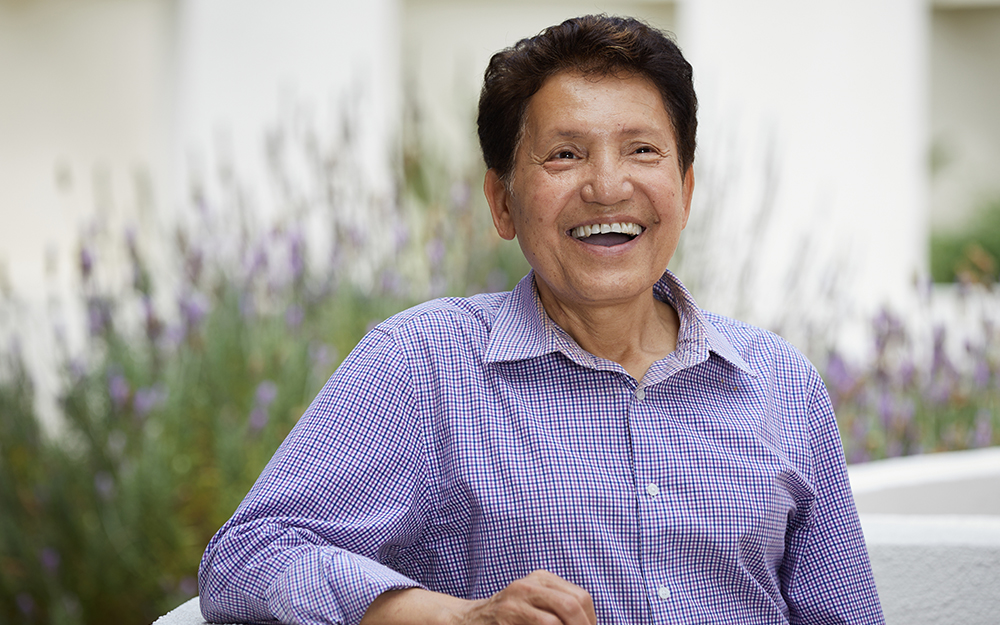This Blood Donor Has Likely Saved Hundreds of Lives
Date
January 14, 2022

Date
January 14, 2022
Credits
Medical providers featured in this article
In Brief
{{cta-block}}
When Michael Hausknost first gave blood at Cedars-Sinai in 1999, he had no idea this initial donation would be followed by 165 others. Also, he couldn't have known that his two decades of lifesaving kindness would land him in the Los Angeles Rams' end zone at Sofi Stadium in January 2022.
But there he was, just before kickoff in a pivotal game against the San Francisco 49ers, holding an official Rams commemorative football in his upstretched left hand while waving with his right to the more than 74,000 in attendance. The fans were rightfully applauding his 22 years of donating blood and platelets and potentially saving hundreds of lives along the way.
"It was incredibly gratifying to be recognized this way," Michael says. "Being on the field was an amazing experience and a great motivator to not only continue donating myself, but to encourage others to become blood donors."
Cedars-Sinai is the official health partner of the Los Angeles Rams. At each Rams' home game, Cedars-Sinai is given an opportunity to spotlight inspirational patients or volunteers and clinicians. In light of January being National Blood Donor Month, Cedars-Sinai elected to honor Michael at the game as well as Larry Pangestu—a highly skilled, often-requested phlebotomist in Cedars-Sinai Donor Services.
On Jan. 11, 2022, the Red Cross declared its first-ever national blood crisis. The nearly two-year pandemic has steadily decreased donations, and the Omicron surge has caused donations to further plummet. According to the Red Cross, this is the worst blood shortage in more than a decade, and some blood types have less than a one-day supply. All blood types are needed, but the highest priorities are types O positive and O negative. Platelets also are urgently needed.
"When you're told you could save the lives of little ones, how can you say 'no'?"
One donation can save three lives
Michael possesses an expansive skill set from his nearly 40-year-career as a banking executive, but saying "no"—particularly when someone's health is at stake—is not his forte.
A native of Vienna, Austria, Michael's inaugural blood donation was inspired by concern for his boss at the time, who had a hereditary condition that necessitated a liver transplant. Prior to the surgery at Cedars-Sinai, Michael—along with other bank colleagues—scheduled appointments with Cedars-Sinai Blood Donor Services to make a directed donation.
From then on, Michael felt compelled to donate.
"Before I became a donor, I was unaware of the urgent, ongoing need for blood. I was especially shocked to learn what a small segment of the population donates blood with any regularity," he explains. "Once I learned how urgent the need was, I couldn't say 'no' to donating regularly."
Michael was referring to the fact that every two seconds someone in America needs blood, and while 38% of the U.S. population is eligible to give blood, only 2% actually donates. Blood is vital for many procedures performed at Cedars-Sinai. In fact, Cedars-Sinai patients need nearly 50,000 blood products every year. One donation can save up to three lives.
Pressing need for platelets
Michael had been donating blood regularly at Cedars-Sinai for several years when he learned from Blood Donor Services that his blood is CMV negative, which means he has never been exposed to cytomegalovirus (CMV), a flu-like virus so common that up to 85% of adults will be CMV positive by age 40.
While CMV is largely harmless to healthy babies, children and adults, it can be fatal to infants and others with weakened immune systems. CMV negative blood is thus a lifeline for immuno-compromised people who need transfusions.
Blood Donor Services asked Michael if he would consider switching from donating whole blood to donating platelets. There's always a pressing need for platelets because many patients, especially those with cancer—including very young patients—need CMV-negative platelet transfusions several times a week.
Without hesitation, Michael became a platelet donor.
Donating platelets takes approximately 90 minutes, so Michael usually scheduled his appointments after work. "It gave me a chance to answer emails and generally catch up," he says.
When pandemic protocols necessitated virtual meetings that coincided with Michael's donation appointments, he nonchalantly multitasked. "There were times I was on Zoom calls while giving platelets," he says.
The 57-year-old Long Beach resident retired in 2021, so now he generally schedules 10 a.m. appointments and then—as he puts it—"make a day of it." That could mean having lunch with his mother who lives nearby, or running errands in West L.A. where he lived and worked for many years.
A welcoming, phenomenal team
Considering Michael has visited Blood Donor Services in the medical center's South Tower nearly 170 times, it's not surprising that—just like Norm on the iconic sitcom Cheers—everyone knows his name. "It's almost like a second home," Michael observes.
Michael sums up his feelings about the Blood Donor Services team: "They're phenomenal. I can't tell you how welcoming they are and how well they treat you. They are so grateful that people donate, and their sincere appreciation is reflected throughout the entire process."
That gratitude also is reflected on the Cedars-Sinai Blood Donor Services' "Donor Wall of Fame." Michael's name is listed in the most elite level—emerald—reserved for those who've made 151 or more donations.
Commenting on his wall-worthy donor achievements, Michael notes that not only is it fulfilling to "do something nice, but you never know when it will be your turn, or your loved one's turn to need a blood or platelet transfusion, so everyone who's eligible should donate."
Michael plans to continue doing his part. "There's no upper age limit for donating, so as long as I'm healthy and able to get here, I will keep donating. I can do good for so many people, and it doesn't cost me anything."
Newsroom: COVID-19 Crisis: Blood Donations Urgently Needed
Blood donations urgently needed
Employees, friends and families are encouraged to donate platelets and blood for patients at Cedars-Sinai. Blood donations typically dip during the holiday season, but the pandemic has made the situation worse.
As a thank you, eligible blood donors can select from available gift cards, including AMC Movie Theatres, Baskin-Robbins, Domino's Pizza and The Coffee Bean and Tea Leaf. Blood Donor Services is open Monday through Saturday in the South Tower, room 1690. To schedule a donation, call Blood Donor Services team at 310-423-4170 or email [email protected].
Ready to make a blood donation?
Here are some tips on how to prepare:
- Maintain healthy iron levels by eating iron-rich foods (PDF) such as red meat, fish, poultry, beans, spinach, iron-fortified cereals and raisins.
- Get a good night's sleep.
- Avoid excessive alcohol consumption before your donation.
- Eat normally and drink extra fluids before and after your donation.
- If you are donating platelets, remember that you cannot take aspirin for two days prior to the donation.
- Bring your driver's license or another form of photo ID.




